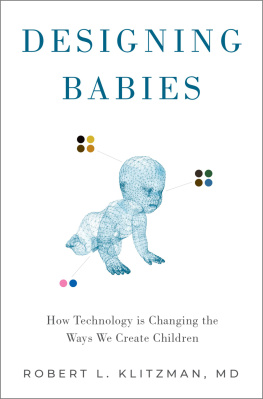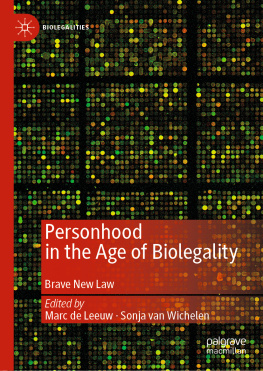Redefining Human Life
Also of Interest
*Biology and the Social Sciences: An Emerging Revolution, edited by Thomas C. Wiegele
*Sociobiology: Beyond Nature/Nurture? Reports, Definitions and Debate, edited by George W. Barlow and James Silverberg
Science and Law: An Essential Alliance , edited by William A. Thomas
Nuclear Waste: Socioeconomic Dimensions, Steve H. Murdock, F. Larry Leistritz, and Rita R. Hamm
*Science, Technology, and the Issues of the Eighties: Policy Outlook, edited by Albert H. Teich and Ray Thornton
Health Risks of Energy Technologies, edited by Curtis C. Travis and Elizabeth L. Etnier
*Cancer Risk: Assessing and Reducing the Dangers in Our Society, Office of Technology Assessment
*Genetic Technology: A New Frontier , Office of Technology Assessment
*The Political Implications of Human Genetic Technology , Robert H. Blank
Risk in the Technological Society, edited by Christoph Hohenemser and Jeanne X. Kasperson
Ethics in an Age of Pervasive Technology , edited by Melvin Kranzberg
*Politics , Science, and Cancer: The Laetrile Phenomenon, edited by Gerald E. Markle and James C. Petersen
*Technology, International Economics, and Public Policy, edited by Hugh H. Miller and Rolf R. Piekarz
*Valuing Life: Public Policy Dilemmas, edited by Steven E. Rhoads
*Accident at Three Mile Island: The Human Dimensions, edited by David L. Sills, C. P. Wolf, arid Vivien B. Shelanski
*Available in hardcover or paperback.
Westview Special Studies in Science, Technology, and Public Policy/Society
Redefining Human Life: Reproductive Technologies and Social Policy
Robert H. Blank
This book examines critical social-policy issues emerging from recent developments in human reproductive technology. Although considerable attention has been focused on the ethical dimensions of these developments, the policy dimension has largely been obscured. Dr. Blank now provides a far-ranging overview of the cumulative impact on society of a wide array of new reproductive technologies and the social patterns that accompany or precede their application.
The book begins with a description of the current context of reproductive decision making. Dr. Blank demonstrates how emerging technologies are producing complex and intense social-policy concerns, then reviews in detail human reproductive technologies, and illustrates the significant consequences of technological innovations for political and legal concepts of rights and obligations. (Examples include recent cases involving torts for wrongful life.) He analyzes possible alterations in the moral and legal status of the fetus in light of apparent technological and social-policy trends and presents a paradigm of fetal rights that reflects these changes. A final case is made for a comprehensive assessment of reproductive technologies, as well as for the urgent need to refine concepts of human life that in the past have been taken for granted, but that now are being challenged.
Robert H. Blank is professor and chairman of the Department of Political Science at the University of Idaho. He is the author of The Political Implications of Human Genetic Technology (Westview, 1981).
First published 1984 by Westview Press
Published 2019 by Routledge
52 Vanderbilt Avenue, New York, NY 10017
2 Park Square, Milton Park, Abingdon, Oxon OX14 4RN
Routledge is an imprint of the Taylor & Francis Group, an informa business
Copyright 1984 by Taylor & Francis
All rights reserved. No part of this book may be reprinted or reproduced or utilised in any form or by any electronic, mechanical, or other means, now known or hereafter invented, including photocopying and recording, or in any information storage or retrieval system, without permission in writing from the publishers.
Notice:
Product or corporate names may be trademarks or registered trademarks, and are used only for identification and explanation without intent to infringe.
Library of Congress Catalog Card Number: 83-51147
ISBN 13: 978-0-367-28531-9(hbk)
There is little doubt that we are swiftly being drawn into an era in which traditional notions of human existence and the nature of human life will be severely tested. Furthermore, these challenges (to what until recently has been accepted as given) promise eventually to alter our views of what it means to be a human being. As we acquire the technical capability to intervene directly in the biological nature of our species, we will be forced to make difficult decisions as to whether or not to exercise these new-found options.
This book examines in detail the social policy dimensions of emerging technologies at one of the most sensitive and fundamental levels of human existencereproduction. An array of reproduction-intervention techniques already are producing formidable ethical questions concerning the definition of the beginnings of human life. Procedures such as in vitro fertilization, cryopreservation of semen, and prenatal diagnosis and screening, although in the early stages of development, are fast becoming compelling policy problems. There has been considerable attention focused on the ethical aspects of these technological applications, but the policy dimension largely has been obscured. Also, books written on reproductive technology have been primarily technical in nature or have centered on a single technique. Contrarily, this book provides an overview of the cumulative impact on society of a wide array of new reproductive technologies and of the social patterns that accompany or precede their application in the United States.
Human procreative choice historically has been a sensitive issue within the United States' cultural framework in which Individual rights are preeminent. Although public policies regarding reproduction have tended to fluctuate between permissive and restrictive positions, the pluralist composition of U.S. society and its liberal tradition have placed considerable constraints on policymakers. In spite of the traditional predominance of parental rights, there consistently have been counterpressures producing restrictive policies that abridge the reproductive freedoms of particular groups. and concurrent attitudinal changes in the public are producing complex and intense social policy issues in human reproduction.
In order to understand why these innovations are so threatening to traditional assumptions regarding human life, it is essential to have a basic knowledge of the technical developments. , therefore, reviews the state of the art of four general areas of genetic and reproductive technology: reproduction-aiding techniques, reproduction-control techniques, prenatal-intervention techniques, and characteristic-screening techniques. This chapter also points out the principal social policy issues that might follow the application of each innovation and emphasizes that each technological advance can be used to further either eugenic or individual choice goals depending on how it is implemented and the motivation behind its application.








